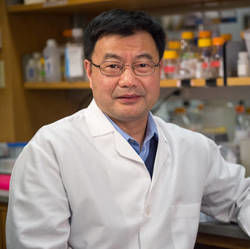Call Now Open
2026 Oxford-Harrington Rare Disease Scholar Award

Oncology, Rare/Orphan
Developing Conventional and Switchable Car T Cells to Treat Acute Myeloid Leukemia (AML) by Targeting a Cell Surface Aminopeptidase
2018 Harrington Rare Disease Scholar
Acute myeloid leukemia (AML) relapsed from chemotherapy is a highly aggressive disease with a five-year survival rate of just 27%. Adoptive cell therapy, including chimeric antigen receptor (CAR)-expressing T cells, is successful for treating leukemia expressing CD19 protein - but this approach has not been extensively explored for AML. There is a dire unmet need to develop more effective approaches using CAR T cells to treat AML.
Dr. Hua and his team have generated novel CD13CART, which targets specific cell surface protein CD13 that is highly expressed in the leukemia cells from most AML patients. "In preclinical models, these CAR T cells killed AML cells," Dr. Hua says. "Remarkably, the killing activity of these CAR T cells can be controlled by a nanobody-containing switch - the switch is like a guided missile and takes the CAR T cells straight to the tumor. The result we have found is that the CAR T cells can completely regress the established and advanced tumor."
Working with the Harrington Discovery Institute, Dr. Hua will evaluate whether this CAR T system is able to kill AML cells to treat patient-derived leukemia. It is hoped that these studies pave the way for developing novel and effective immunotherapy to cure drug-resistant AML.
“The Harrington Discovery Institute shows great vision in helping scientists translate their ideas into potential practice use.”
Source: Article from 2019-20 Annual Publication.